Afghanistan War, CIA Sponsored Terror, Civil Liberties, Criminalizing Dissent, Gaza, Human Rights, Military Tribunal, Political Prisoner, Surveillance, Targeting Muslims, Torture, Truth to Power, War Resister
Podcast: Play in new window | Download
Updates:
- Swedish Judge Denies Assange Lawyers Request To Set Aside 2010 Arrest Warrant On Sexual Misconduct Allegations
- Torture Memo Author John Yoo Awarded Endowed Faculty Chair At University of California Berkeley School Of Law
- Michael Ratner: The Trial of Donald Rumsfeld
—–
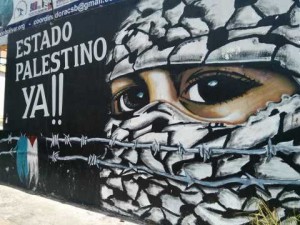
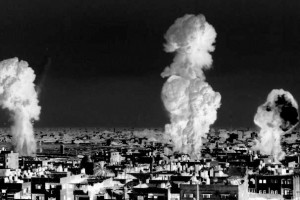
Israel’s Continued Disproportionate Use Of Force Against Palestinian Civilians
In a slow escalation of violence in the Gaza Strip, the Israeli Army responded earlier this month by launching “Operation Protective Edge” as Israeli jets dropped hundreds of bombs on the impoverished coastal enclave of nearly 2 million Palestinians. At this time, more than 200 Palestinians have been killed and more than 1400 injured. According to the United Nations, 77 percent of those killed are civilians and yet the massacre sadly continues. The vicious attacks are framed as a mutual conflict or exchange of fire. The reality is that the low quality rockets hitting Israel are not comparable to Israel’s powerful military strikes.
Phil Weiss:
- In a nutshell I think Israel is trying to destroy the unification agreement between Hamas and Fatah. They don’t want diplomacy they want to end that unification deal.
- It’s a great danger to Israel that the Palestinians are united, they want them divided.
- They’ve used any pretext they can in the last month including the horrifying abduction and killing of these Israeli teens on the West Bank. They’ve used any pretext they can to break up, to try to break up that understanding.
- The goals of a unified Palestinian government are to achieve some type of Palestinian freedom.
- They would go on to International Criminal Court, International bodies and say hey, this occupation has been going on nearly 50 years . .. are you finally going to give us a state, sovereignty? If we can’t get sovereignty we’ll move to an equal rights struggle. .
- I think the good thing that they show is there’s no green line. Israel operates with impunity, with complete autonomy all over historic Palestine. Netanyahu has said we’re never giving up the West Bank. It’s sort of an announcement to the world, this is one state.
- The legal response and the one you demonstrated (Michael Ratner) against Cast Lead was this is Internationa Humanitarian Law and Human Rights law apply here and Israel should be brought up before International bodies for violating those laws.
- The one form of progress is there’s no ground invasion this time. (this is what he thought at the time)
- Michael Ratner, you and I have a somewhat different relationship to the mainstream press in that I used to be part of it and now and then I have fantasies of getting back in.
- With that proviso, I think there has been a little bit of progress in the mainstream so you have on NBC news, you have words opening that report saying these people are trapped, they have no where to go and its a lopsided conflict. I didn’t hear that around Cast Lead.
- I’m not trying to defend the mainstream so much to say that I feel that there is some real shift going on.
- Michael Ratner: Here’s a question about half-full. Do you want me to call the family that lost 17 kids in the same household in Gaza? That’s not half-full. That’s empty.
- You’re putting me in the position of saying what I’m about to say which is the slaughter of 200 people is different from the slaughter of 500 people.
- Michael Ratner: We’re still counting Phil.
- The Jewish American community is highly responsible for this behavior, for this conduct that’s going on there.
- How useful was that aircraft carrier (Israel) when we were occupying Iraq and we were invading Afghanistan? It wasn’t at all useful to us.
- I think its a burden (Israel) I think it’s a millstone around our necks because it says the United States stance is slaughtering brown people.
- You look at J Street, this great liberal Zionist organization. They’re justifying everything Israel is doing now.
- There’s only a couple of Jewish organizations that stood up and said this is wrong. Jewish Voices For Peace and Jews Say No.
- I think there’s an implicit understanding around the world now about why these people are firing rockets.
- One of things you hear in Israel is the existential threat, in that people are delegitimizing us and I think that’s great news.
- I see more voices talking about this conduct as just beyond the pale. I feel that the world is regarding this as a central human rights issue.
Guest – Philip Weiss, founder of Mondoweiss, longtime journalist and regular contributor to the Nation and a fellow at the Nation Institute. Philip is the author of two books a political novel, Cock-A-Doodle-Doo, and American Taboo, an investigative account of a 1976 murder in the Peace Corps in the Kingdom of Tonga. Weiss is one of the editors of The Goldstone Report: The Legacy of the Landmark Investigation of the Gaza Conflict.
——–
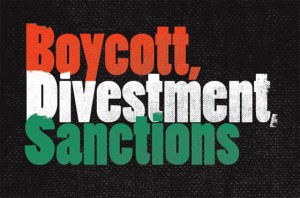
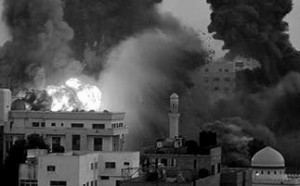
Andrew Kadi:
- I don’t necessarily know that Israel has any real goals that will benefit Israeli society other than possibly the ethnic cleansing of Palestinians in Gaza, forcing them to move out.
- They’re leaving Gazans in deplorable conditions. They have unilaterally absolved themselves of their legal obligation under International law to the population in Gaza and have instead declared something that I think nobody else recognizes that Gaza is somehow a hostile territory or an enemy territory.
- It’s counter-productive if your belief that the goal or the end goal for the Israeli government is peace.
- The majority of these rocket attacks are pretty small projectiles as anyone who has seen them knows has no chance of actually injuring anyone or causing damage. Some of them are as small as a Coke can.
- Hamas has deployed larger rockets in last 4 years that can fire through a building. ‘
- By and large these attacks are being carried out by other groups round the clock. The ones that Israel is referring to are usually other groups that have nothing to do with Hamas.
- I would say the rocket attacks are a cry for help from Gaza.
- In the end, Gazans are isolated, there’s a siege, a blockade that Israel’s carrying out. I think that Gazans don’t want to be subject to it anymore.
- They want to be able to live like any other population.
- The American Foreign Services committee published a list of American companies directly involved and complicit in the attacks on Gaza.
- Those companies include Boeing, Hewlitt Packard, Elbit Systems, Lockheed Martin, General Dynamics, General Electric, Northrup Grumman, Raytheon.
- In 2005, Palestinian civil society called for a Boycott, Divestment and Sanctions against Israel until it complies with the 3 tenets of International law.
- The end of the occupation, equality for the Palestinian citizens of Israel and the right of refugees to return to their homes.
- Other companies that folks can boycott, Sodastream, Ahava cosmetics, Strauss Group, Osem – Tribe Hummus, Sibeon Company.
Guest – Andrew Kadi, a human rights activist and digital media specialist currently serving on the Steering Committee of the US Campaign to End the Israeli Occupation. He’s contributed to the Guardian’s Comment is Free, The Electronic Intifada, Mondoweiss, Left Turn and other publications.
————————————————————
CIA Sponsored Terror, Civil Liberties, Criminalizing Dissent, Gaza, Guantanamo, Human Rights, Military Tribunal, Prison Industry, Surveillance, Targeting Muslims, Torture
Podcast: Play in new window | Download
Updates
——
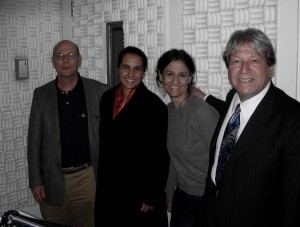
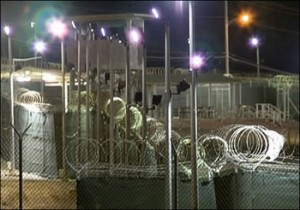
Michael Ratner Marks CCR Case Rasul v Bush: Courage To Stand Up At The Right Time
In early 2002, the Center for Constitutional Rights filed two habeas petitions, Rasul v. Bush and Habib v. Bush. This challenged the U.S. government’s practice of holding foreign nationals captured in connection with its war on Afghanistan and al-Qaeda in indefinite detention. This is without counsel and without the right to a trial or to know the charges against them. Michael Ratner then explains the timeline of how the Supreme Court, over the administration’s objections, agreed in November 2003 to hear the cases of the Guantanamo detainees, and also the case of al Odah v. Bush. This week’s anniversary marks the historic ruling on June 28th, 2004 that detainees have access to U.S. Courts to challenge their detention.
Attorney Michael Ratner:
- We won that in June 28, 2004. We won it in a 6-3 decision. The Center for Constitutional Rights was the only human rights organization on the case. The only one willing to take that case.
- Many of my colleagues, not me, thought that would be the end of Guantanamo (Bay Prison)
- There are still 149 people left in Guantanamo, over half of them have been cleared for release. The reason I want to mark this is because it talks about a struggle that in some ways was successful and in some ways not successful.
- It also talks about the courage of these lawyers that started these cases in the thick of the most anger in the country and . . . fears that we would lose our fund raising.
- We thought at that time, as I said some of our friends, said that we would close Guantanamo. But since that time there’s been incredible stubborn resistance by all 3 branches of government.
- Bush first, then Obama, despite promises has failed to live up to them, promises to close Guantanamo. The courts are therefore useless now in this.
- Congress is going retrograde at a speed unimaginable, trying to ban every transfer for the rest of our days from Guantanamo.
- Within 2 months of the 911 attacks, President Bush issued Military Order Number 1. It’s November 13, 2001 Military Order, I thought a coup de tat happened in the country. It said the president had the authority to pick anyone, anywhere in the world. Hold them indefinitely, incommunicado and abolish habeas corpus.
- We tried to get other human rights organizations to do it. No one else to their shame would come aboard with the Center for Constitutional Rights.
- The Center for Constitutional Rights could’ve gone under for this. Let me be clear. It was a much smaller institution. It didn’t have that much funding. There was a high risk that we were going to get cut off completely.
- January 11, 2002, they take the people, the first plane load to Guantanamo.
- We never expected the Supreme Court to take the case in 2003. When it finally did, it accepted the case. It was argued in April 2004. It was decided in our favor on June 28.
- We then put out a call for other lawyers to join us. Over a hundred lawyers joined us immediately. 600 within a year or two. We then created what I call a mass movement of lawyers to fight this.
- As a result of the 2004 ruling, our first attorney went down (to Guantanamo) Gita Gutierrez. The big thing that Gita’s visit represented is that we found out about torture at Guantanamo.
- You begin to understand when a government does incommunicado detention in an offshore facility that doesn’t have any court review, there’s a reason, and the reason is almost entirely torture.
- There’s been no prosecution. Obama has given them all a huge pass unfortunately. It’s really damaging because what it has done for torture is its saying, torture isn’t necessarily illegal, Obama claims it’s illegal but he didn’t prosecute anybody.
- So, next time we have another “scare” like this people will say it’s a political issue, we can torture, it works, etc.
Guest – Law and Disorder Co-host Attorney Michael Ratner, President Emeritus of the Center for Constitutional Rights (CCR), a non-profit human rights litigation organization based in New York City and president of the European Center for Constitutional and Human Rights (ECCHR) based in Berlin. Ratner and CCR are currently the attorneys in the United States for publishers Julian Assange and Wikileaks. He was co-counsel in representing the Guantanamo Bay detainees in the United States Supreme Court, where, in June 2004, the court decided his clients have the right to test the legality of their detentions in court. Ratner is also a past president of the National Lawyers Guild and the author of numerous books and articles, including the books Who Killed Che? How the CIA Got Away With Murder, The Trial of Donald Rumsfeld: A Prosecution by Book, Against War with Iraq and Guantanamo: What the World Should Know, as well as a textbook on international human rights.
——-
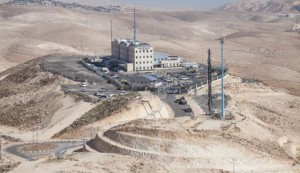
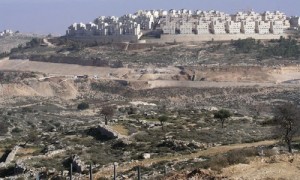
Israel Increases Rate of Palestinian Home and Structure Demolition
In the past few months, the Israeli government has stepped up its campaign of Palestinian home demolitions, specifically in the E1 area between Jerusalem and the Maale Adumim settlement. United Nations reports show 231 Palestinians had been displaced from their homes in early 2014. This is at a much quicker pace than 2013. Remember the demolishing of homes include livestock pens, fences, water reservoirs, schools, all vital to the livelihood and communal life of Palestinians. The Israeli Committee Against House Demolitions estimates since 1967, nearly 29 thousand Palestinian homes and livelihood structures were demolished in the Occupied Territories. However, at the same time the Israeli government has announced the construction of thousands of homes and buildings in the settlements of the West Bank and East Jerusalem.
Dr. Jeff Halper:
- This is an area called E1, that’s the planner’s jargon.
- The significance of E1 is that it closes the last north south corridor the Palestinians have from the north of west bank to the south since they can’t come through Jerusalem.
- Even the United States say if Israel build in E1 and closes that corridor that’s the end of the two state solution.
- This guy Irwin Moskowitz who is a big casino out in California gives millions to the settlements. He bought for the Israeli government a 10 million dollar state of the art police station. It’s the main police headquarters for all the West Bank that is in the E1.
- There’s a whole infrastructure of roads leading to Jerusalem, but Israel has still refrained from actually building. The plan is to build 3,500 housing units that absolutely, thickly closes that corridor to Palestinians.
- The 2 state solution is gone but this (building of E1 area) would be an absolute measure of the ending of the 2 state solution.
- We’re trying to mobilize international civil society against the occupation. The occupation is not going to end because the Israeli public rise up and end it.
- They’re living the good life, they’re profiting from the occupation especially from the point of view of testing and developing and selling weapons systems tested on Palestinians.
- And the governments of the world aren’t doing their job. Governments manage conflicts, they don’t resolve conflicts.
- So I’m here in the United States to try to speak to activist groups, church groups because the churches here have a very strong moral voice.
- We’re dependent on the Palestinians for leadership on where to go next. Not being Palestinians, we can’t tell them what the solution is.
- I think its urgent we formulate a one state solution. A one democratic bi-national state.
- I think there has to be a bi-national component in which both peoples have a sense of self expression and limited self determination within the common country.
- You have to create structures of sharing power.
- I think the Palestinians would have the ability to achieve a fair amount of parity with Israel within a short amount of time if we create this consociational type of state.
- Israel is beginning to be more and more of an albatross around the American’s neck.
- Operation My Brother’s Keeper had nothing to do with these kids who disappeared. It was a stand alone operation that used the disappearance as a trigger for being launched. The whole idea was to crack down on Hamas, to weaken the PA to keep it dependent on Israel.
- I think what’s happening is we’re in the midst of collapse.
- Jeff@ICAHD.org
Guest – Dr. Jeff Halper, co-founder and Director of ICAHD, the Israeli Committee Against House Demolitions. He was born in 1946 in Minnesota and emigrated to Israel in 1973. Since then he has been a tireless advocate for justice and civil rights for all Israelis and Palestinians. He spent ten years as a community worker in Jerusalem aiding low-income Mizrahi families. He co-founded ICAHD in 1997 to help resist Israel’s strategy of house demolitions in the Occupied Palestinian Territory. He is the author of three books, ‘Between Redemption and Revival: The Jewish Yishuv in Jerusalem in the Nineteenth Century’, ‘An Israeli in Palestine: Resisting Possession, Redeeming Israel’, and ‘Obstacles to Peace: A reframing of the Palestinian – Israeli Conflict’. In 2006 Dr. Halper was nominated for the Nobel Peace Prize, citing ICAHD’s work “to liberate both the Palestinian and the Israeli people from the yoke of structural violence” and “to build equality between their people by recognizing and celebrating their common humanity.”
—————————————————————————-

Please help support Law and Disorder, the show is now a sponsored project of Fractured Atlas, a non-profit arts service organization. Contributions for the charitable purposes of Law and Disorder must be made payable to Fractured Atlas only and are tax-deductible to the extent permitted by law.
Civil Liberties, Criminalizing Dissent, Gaza, Habeas Corpus, Human Rights, NSA Spying, Political Prisoner, Prison Industry, Surveillance, Targeting Muslims, Torture, War Resister
Podcast: Play in new window | Download
Updates:
- Wikileaks Reveals The Other Country NSA Surveilled All Content: Media Blackout
- U.S. Government Can Destroy People: Informant Sabu (Hector Xavier Monsegur) And Jeremy Hammond
- Remembering League of Revolutionary Black Workers Founder General Gordon Baker Jr.
- Read General’s Letter To The Detroit Draft Board
- Michael Ratner Resigns From Brandeis University
- International Advisory BoardMichael Ratner’s Open Letter To Brandeis University President Published In Forward Thinking
- Coalition of Imokalee Workers Demonstrations In Columbus, Ohio
- Glenn Greenwald Nowhere To Hide Book Tour -Ticket Give Away – Listen To Answer Question
- We Have 5 Tickets In Each City To Give Away
- Dates City
June 17, 2014 Seattle, WA
June 18, 2014 San Francisco, CA
June 19, 2014 Los Angeles, CA
June 21, 2014 San Diego, CA
June 23, 2014 New York, NY
June 26, 2014 Rosemont, IL
——
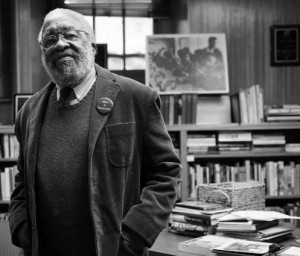
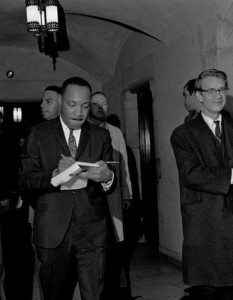
Remembering Dr. Vincent Harding
Last month pioneering historian, theologian and civil rights activist Dr. Vincent Harding had died at the age of 82. Harding was a close adviser to Dr. Martin Luther King Jr. and wrote King’s famous antiwar speech, “Beyond Vietnam: A Time to Break the Silence.” King delivered the address at Riverside Church in New York City on April 4, 1967.
After King was assassinated, Harding became the first director of the Martin Luther King Jr. Memorial Center and of the Institute of the Black World. He later became Professor of Religion and Social Transformation at Iliff School of Theology in Denver. After serving in the Army for several years Harding became a pacifist and later served as co-chairperson of the social unity group the Veterans of Hope Project. He’s the author numerous books including There Is A River and Wade in the Water: The Wisdom of the Spirituals.
Dr. George Tinker:
- Vincent was sometimes called by black activists across the continent, the gentle giant.
- Giant, not because of his physical size but because of intellectual stature.
- Last summer we did a conference together speaking to a national conference of Quakers.
- He was an incredibly soft-spoken and gentle person, yet could be so absolutely incisive in his quiet comments.
- He was so persuasive that everyone had to pay attention to him.
- On campus he was either in the midst of a student group trying to quietly cajole them into activism themselves or once the students became activists, he was one of the few faculty that was right there with students walking them through that activism.
- Every thing in that speech (Beyond Vietnam) is a part of what Vincent lived every day.
- He was in the Army during the Korean War and became a convert to Gandhi and non-violence theory.
- His participation to bringing me to Iliff was a clear signal that he was one of those civil rights warriors who was not satisfied with interpreting the civil rights struggle as a black and white issue.
- When we engaged in protest on the streets of Denver, beginning around 1989, getting ready for the 1992 Columbian Quinscentenary, we had Iliff students who would come out with the American Indian Movement of Colorado to help us protest what we always framed as state supported hate speech.
- We were never against Italians celebrating their heritage but its the fact that Columbus Day is a federal holiday. It’s a federal celebration then, of the genocide of Indian people.
- About a year and a half ago he joined Jewish activists and African American activists on a trip to Palestine, the West Bank. He came back deeply affected.
- He immediately began to see the deep deep connection between the Palestinian struggle for freedom and American Indians on this continent.
- We’re seeing it still today, US foreign policy is characterized by violence and the threat of violence and if not military violence, economic violence.
- Vincent and Dr. King were men of conscience who once they understood the truth in Vietnam could not help but speak to it.
- 18 year old kids don’t have the clear reading of history to fall back on their decision making. (military)
- His passing is a passing of an era marked by the passing of Maya Angelou. It deeply deeply saddened me because I was hoping this next month to have lunch with him.
Guest – Dr. George Tinker, a colleague of Dr. Vincent Harding at the IIliff School of Theology. Dr. Tinker. He teaches courses in American Indian cultures, history, and religious traditions; cross-cultural and Third-World theologies; and justice and peace studies and is a frequent speaker on these topics both in the U.S. and internationally. teaches courses in American Indian cultures, history, and religious traditions; cross-cultural and Third-World theologies; and justice and peace studies and is a frequent speaker on these topics both in the U.S. and internationally. His publications include American Indian Liberation: A Theology of Sovereignty (2008); Spirit and Resistance: Political Theology and American Indian Liberation (2004); and Missionary Conquest: The Gospel and Native American Genocide (1993). He co-authored A Native American Theology (2001); and he is co-editor of Native Voices: American Indian Identity and Resistance (2003), and Fortress Press’ Peoples’ Bible (2008).
———————————————————————————–

Please help support Law and Disorder, the show is now a sponsored project of Fractured Atlas, a non-profit arts service organization. Contributions for the charitable purposes of Law and Disorder must be made payable to Fractured Atlas only and are tax-deductible to the extent permitted by law.
CIA Sponsored Terror, Civil Liberties, Gaza, Habeas Corpus, Human Rights, Military Tribunal, Political Prisoner, Prison Industry, Surveillance, Targeting Muslims, War Resister
Podcast: Play in new window | Download
Updates:
—–
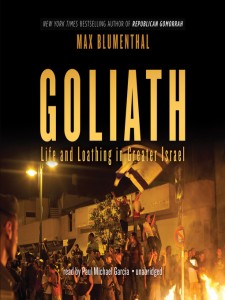
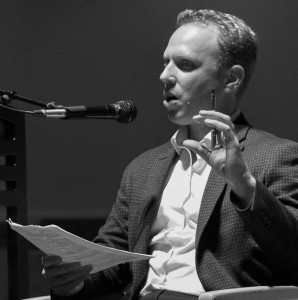
Goliath: Life and Loathing In Greater Israel: Max Blumenthal
Operation Cast Lead in 2008, is a starting point in the book Goliath: Life and Loathing In Greater Israel where award winning journalist and author Max Blumenthal shows the reader how a right wing government in Israel rose to power. His book takes hard look at Israeli authoritarian politics through a cross section of interviews from the homes of Palestinian activists to the political leaders behind the organized assault against civil liberties. Max gives readers a rare look into Israeli society that many will not write about.
Max Blumenthal:
- The first title was Master Race Democracy.
- Of course Israel is always portrayed in our media as this plucky little David surrounded by the Arab Goliath. Of course our reality is 180 degrees different.
- Matzpen warned that this would happen, they took a full page ad in Harretz saying we will become a police state and a nation of murderers.
- That’s where I come in to show that all of their darkest prophecies have been fulfilled and realized.
- I take you through Israeli society and through the key institutions of Israeli life to show how its playing out.
- From my time in Jerusalem where an anti miscegenation movement is burgeoning in the streets of Israel, leading mob attacks on young Palestinian men who are accused of making passes at Jewish women to the convention at the Jerusalem Ramada where key state Rabbis sit on a panel before right-wing settlers, including settler vigilantes leaders of the anti miscegenation movement defend a book, a guide on how and when its permissible to kill non-jews. A guide to genocide which is being distributed in Israeli Army units.
- Avigdor Lieberman is the man that basically promised to transfer 100s of thousands of Palestinians. He’s a rising force in Israeli society. It’s the youth whose hearts and minds they command.
- I take you into the Knesset to meet the younger legislators and the rising stars in Lieberman’s party and Netanhayu’s party who are far to the right of Netanyahu. Netanyahu really just commands the hollow center of Israeli politics.
- Rotem was great because he and other hard core right wingers have this whole philosophy of being dugri or straight. There was nothing I could say to shake him. He looks at me coming in at just another pathetic Jewish liberal who doesn’t really get what it takes to prevent a second holocaust and that’s what he said his goal was.
- It’s completely different from talking to a Republican in the United States who has to pander to some kind of civil rights sensibility.
- That’s another thing reviewers missed about my book is that I analyzed these key votes on major anti-democratic laws going back to 2009. Laws like the Nakba Law which basically criminalized observance of Palestine dispossession in 2008. Laws like the Acceptance to Community Law which legitimizes racial and religious discrimination for communities of under 500.
- These are laws that strip off the veneer of democracy and expose apartheid for what it is.
- It’s the right-wing that has captured the heart of Israeli society because they have the dynamism, they’re driving the agenda forward. (using a simple mantra – “finish 48”)
- In 1948 and actually starting in 1947, 750 thousand Palestinian Arabs were expelled to allow the creation of a Jewish state with a Jewish demographic majority, but many stayed behind. 20 percent of the state of Israel is non-Jewish Palestinian.
- They view Palestinian citizens of Israel increasingly as a fifth column, as a trojan horse for the Arab world, for Arab nationalism and Islamism.
- In order to become a citizen of Israel you have swear loyalty to the Jewish state and that applies to Palestinians in east Jerusalem.
- You will meet the people who are trying to push back inside Jewish-Israeli society on the pages of my book because they were my roommates, my friends. They took me to the flashpoints of ethnic cleansing and conflict.
- I would number 700 or less active left wingers who are actively leveling their bodies against the occupation and apartheid.
- The writings on the wall for these activists that there is very little room for them left in Israeli society.
- What they’ve (leftists in Israel) done is call to the outside. They’re calling to us. They organized around the boycott from within committee and they’re signing letters asking performers not to come to Israel. They’re signing letters calling on Americans to boycott their country.
- That is really where the activism of the radical left wing Israelis is going.
- The Jewish National Fund is supposed to operate within the Green Line only and is probably the leading Jewish non-profit in the world. It receives the most donations from diaspora Jews in the world.
- Steven Harper the Prime Minister of Canada recently spoke at one of their banquets. They’ve paid Bill Clinton hundreds of thousands to speak at their banquets.
- They are also the premier organization linked to the Israeli government involved in ethnic cleansing and crimes against humanity.
- It’s something we talk about a lot. How Zionism is trying to capture Judaism and change what it means to be a Jew and declare us to be who are not only not Zionists but object to this redefinition of Judaism and cast us out and declare us to be anathema.
- You can see it in my video Feeling the Hate where I go to the heart of Jerusalem and meet American Jews from around the country and they line up around my camera the night before Barack Obama’s historic address in Cairo.
- Zionism is attracting those who are magnetized by the kind of bellicose identity that it requires and is repelling anyone who has any liberal sensibility or at least throwing them into a moral crisis.
- I showed up as # 9 on Simon Weisenthal Center’s list of anti-Israel, anti-semites and they called me an anti-semitic Jew, not even a self-hating Jew but a Jew who hates Jews.
- I was tied with Alice Walker by the way.
- They literally count the calorie of each Gaza resident with complex mathematical formulas.
- Barack Obama has never challenged the idea of holding 1.8 million under siege because they possess the wrong ethnicity.
- When a situation like this is taking place and expanding as Jeff Halper from the Israeli Committee Against Home Demolitions says into a “global Gaza” where the techniques that have been used to control people in the Gaza Strip are literally being exported because Israel is the only country that has the ability to basically lab test such a regime of domination.
- That’s very appealing to people in the United States, the Department of Homeland Security, to private prison companies like CCA.
- Twitter – @maxblumenthal
Guest – Max Blumenthal, an award-winning journalist and bestselling author whose articles and video documentaries have appeared in The New York Times, The Los Angeles Times, The Daily Beast, The Nation, The Guardian, The Independent Film Channel, The Huffington Post, Salon, Al Jazeera English and many other publications. He is a former Puffin Foundation Writing Fellow for The Nation Institute. His book, Republican Gomorrah: Inside The Movement That Shattered The Party, is a New York Times and Los Angeles Times bestseller.
———————
Civil Liberties, Gaza, Habeas Corpus, Human Rights, Surveillance, Targeting Muslims, Torture, Truth to Power, Uncategorized
Podcast: Play in new window | Download
Updates:
—
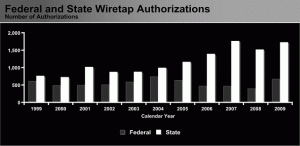
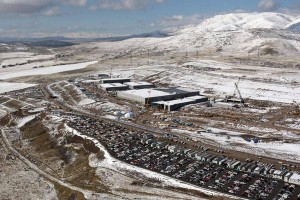
Senate Votes To Extend Warrantless Wiretaps For Five More Years: No Oversight, No Transparency
Days before 2012 drew to a close, the U.S. Senate voted 73-23 to reauthorize the FISA Amendments Act of 2008 for five more years. This is the unconstitutional spying bill that violates the Fourth Amendment and gives vast unmonitored authority to the National Security Agency to conduct dragnet surveillance of American’s’ international emails and phone calls.
Michelle Richardson:
- The Senate took up the FISA Reauthorization Bill right at the end of the year and they did consider a handful of very moderate amendments that wouldn’t have actually interfered with the collection of information but would make it more transparent to Congress.
- In an open and free democracy there should be no secret law.
- The original FISA was much more targeted. It required a more traditional probable cause, finding an individualized warrant before you could go up and tap a phone.
- After 911 Congress started systematically lowering the standard for obtaining this information.
- They made it easier so you could go around the court, and do it administratively.
- They lowered the standard so there’s no longer a probable cause. The FISA Amendment Act is probably the biggest change in the last decade.
- You no longer have to name who you’re going to tap, the phone number or stated facility.
- Instead we’re going to do these programmatic orders so the court is no longer involved in deciding who will be tapped.
- I’m not going to tap a specific American, but I want information about Yemen.
- Theoretically this isn’t turned into the United States at any specific person. We think its being used for bulk collection.
- The way the internet works now, sometimes your communication will travel around the world before landing next door.
- A lot of times the equipment is intentionally built so the government can tap directly into the system.
- FISA – Foreign intelligence which includes the undefined national defense of the United States.
- I think there is reason to believe this is a self correcting situation and that people will start looking at this technology and understand more about what’s out there.
Guest – Michelle Richardson is a Legislative Counsel with the ACLU Washington Legislative Office where she focuses on national security and government transparency issues such as the Patriot Act, FISA, cybersecurity, state secrets and the Freedom of Information Act. Before coming to the ACLU in 2006, Richardson served as counsel to the House Judiciary Committee where she specialized in national security, civil rights and constitutional issues for Democratic Ranking Member John Conyers.
—
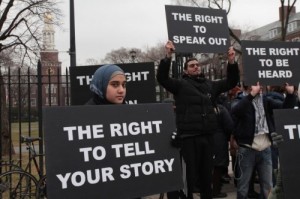
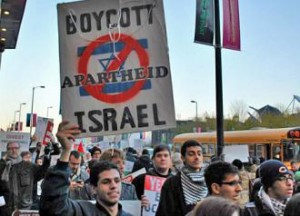
Boycott Divestment Sanction Controversy At Brooklyn College
Last month, a backlash of controversy erupted after the announcement of a student group at CUNY’s Brooklyn College, Students for Justice in Palestine will host two speakers who will discuss their views on the BDS movement. The BDS movement as many listeners may know calls for boycott, divestment and sanctions against Israel in protest of the government’s oppressive policies toward the Palestinian people. The speakers are Palestinian BDS advocate Omar Barghouti and University of California Berkeley philosopher and BDS supporter Judith Butler. The event was co-sponsored by numerous student and community groups, as well as Brooklyn College’s political science department.
The backlash included a threat by New York City Council members and Congressman Jerry Nadler to defund Brooklyn College and opinion pieces by Harvard Law Professor Alan Dershowitz who called the event a “propaganda hate orgy,” another daily newspaper labeled it “Israel-bashing.
Omar Barghouti:
- Specifically the BDS call said that Israel and institutions and corporations that are complicit in Israel’s violations of International Law should be boycotted, divested from and eventually sanctioned in order to achieve the 3 basic rights of the Palestinian people under International Law.
- Ending the occupation of 1967, which include the illegal colonies, the wall, ending the system of discrimination within Israel itself which meets the UN definition of apartheid, the third is the right of return for refugees which is their basic inalienable right under international law.
- In order to achieve these 3 basic rights, we absolutely need international solidarity as was done in the anti-apartheid movement in South Africa, we can’t do it alone.
- Your tax money is funding Israel occupation and apartheid. You have an obligation to question where your money is going to and how its being used to oppress us.
- I think that the New York Times editorial supported having a debate at Brooklyn College says it all. We could have never imagined such a thing, a year ago.
- The government of South Africa’s ruling party the ANC endorsed BDS this last December.
- Many Jewish groups have joined BDS campaigns and are leading BDS campaigns.
- Bullying is one thing and response from critics is another. We’re very open to debate but no one would debate us.
- They’re running scared of debate.
- Not every event, every talk has to be balanced.
- The balance is overall. Those accusing this panel of being imbalanced themselves like Dershowitz, always speak solo, unopposed, espousing the most extreme ideas like torture, a war crime.
- They’re twisting the very definition of academic freedom.
- Human rights are difficult. If you have a master slave relationship and the slave insists on freedom and nothing less than freedom that upsets the order.
- Did equality in Alabama delegitamize whites? It delegitamized apartheid in the South.
- We’re delegitamizing the Israel’s occupation, apartheid and denial of Palestinian rights. We’re insisting on our rights. We’re not delegitamizing any people.
- We’re delegitamizing an order that’s illegal by definition. Apartheid is illegal. Occupation is illegal. Building colonies on occupied territories is illegal. Ethnic cleansing is illegal.
- It’s not a blanket boycott against every company that’s complicit because that wouldn’t work.
- BDS is about context sensitivity, graduality and sustainability.
- You’ve got to address the most sinister companies as it were. The most seriously involved in human rights violations and move toward others, to teach others a lesson.
- There’s a big campaign against soda stream led by an Interfaith coalition because Soda Stream is manufactured in an illegal settlement in the occupied territories.
- We need coresistance, not coexistance until we end oppression.
- www.BDSMovement.net / www.PACBI.org
- www.WhoProfits.org
- Dissent and any argument against Israeli policies is almost becoming illegitimate in this country. It’s a new McCarthyism that the Israeli lobby is leading.
Guest – Omar Barghouti, the founding member of the Palestinian Campaign for the Academic and Cultural Boycott of Israel and the Palestinian Civil Society Boycott, Divestment and Sanctions (BDS) campaign.
Listen to Law and Disorder May 2011 Show with Guest Omar Barghouti
———————————————————-
Afghanistan War, Civil Liberties, Criminalizing Dissent, Gaza, Guantanamo, Habeas Corpus, Human Rights, Surveillance, Targeting Muslims, War Resister
Podcast: Play in new window | Download
Updates:
—-
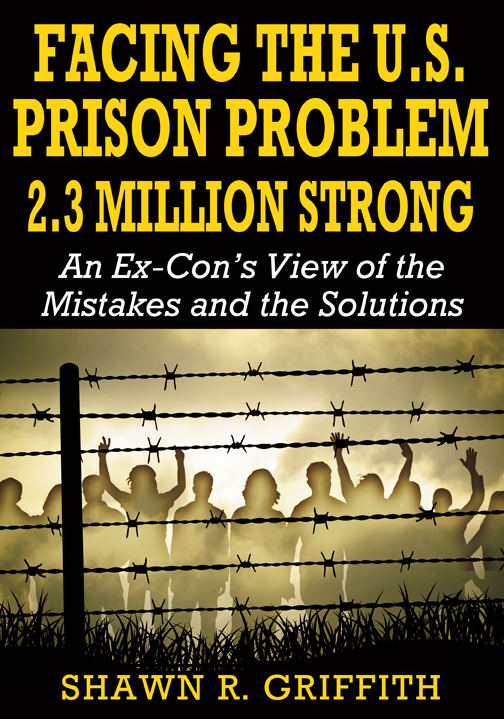
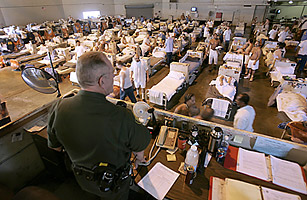
Facing The U.S. Prison Problem 2.3 Million Strong
As many listeners may know the United States has incarcerated more people than any other country in the world, and also within the history of humanity. The newly published book titled Facing The U.S. Prison Problem 2.3 Million Strong by Shawn Griffith gives the reader a rare perspective from an ex convict who served a 20 year sentence in some of the harshest conditions. These include being confined to a small cement cell in the late Florida summer without sheets, laying in pools of sweat on a plastic covered mattress. Vindictive prison guards and case workers in the criminal justice system had made life nearly unbearable for Shawn Griffith. His book hopes to inspire movement building among the families of prisoners to develop a non-profit corporation called the Prisoner Family Union.
Shawn Griffith:
- As a youngster, it was a very difficult childhood.
- My parents were very religious, there was a lot of alcohol abuse.
- Early on I went on a truth seeking thing. I also became very rebellious at a young age.
- At 16, I met these people who were crack cocaine addicts. They were the only place I could find to stay off the street. They introduced me to the drug, which I had no knowledge of, how addictive it was.
- Then they told me I had to help them support their habit. They started training me, taking me to homes showing me how to burglarize them, steal cars, a number of things to support our habits.
- When I committed an armed robbery for 100.00 ended up with a 24 year sentenced in which I did 20 years.
- I knew that I had some emotional problems, I started studying psychology for about 4 years. By the age of 23, I attempted to escape initially.
- In Chapter 1, where I explain in detail, some of the sentencing laws that were passed in Florida, those same laws that were passed show decreases in crime rate before the laws were instituted.
- Inmates and their families are by majority below the poverty line. They don’t have a lot of resources to fight back.
- These large groups that influence the correctional system, they are unionized.
- Speakoutpublishing.com
Guest – Shawn Griffith, founder of Speak Out Publishing and has been an institutional teacher of adult basic education for the past sixteen years. He has received many teaching and writing awards from professors and others with whom he has worked, as recently as 2011. He is author of the recently published book Facing The U.S. Prison Problem 2.3 Million Strong
———-


Professor Francis Boyle: Palestine Observer Status
Now that Palestine has been voted in as a new non member state status within the United Nations, Palestinian leaders can join the International Court of Justice and the International Criminal Court and challenge Israel’s violations of international law. We talk with Professor Francis Boyle, the leading expert in international about his role as a Palestine observer. In his book Palestine, Palestinians and International Law, Professor Boyle outlines 6 critical points, among them are:
1. “Palestine can join the Rome Statute for the International Criminal Court and file a Complaint with the ICC against the illegal settlements and settlers, who are committing war crimes;
2. “Palestine can join the Statute for the International Court of Justice, sue Israel at the World Court, and break the illegal siege of Gaza;
3. “Palestine can join the Law of the Sea Convention and get its fair share of the enormous gas fields lying off the coast of Gaza, thus becoming economically self-sufficient;
4. “Palestine can become a High Contracting Party to the Four Geneva Conventions [this deals with the laws of war];
5. “Palestine can join the International Civil Aviation Organization and gain sovereign, legal control over its own airspace;
6. “Palestine can join the International Telecommunications Union and gain sovereign legal control over its own airwaves, phone lines, bandwidths.”
Professor Boyle is the author of many books including Palestine, Palestinians and International Law, The Palestinian Right of Return Under International Law, and United Ireland, Human Rights and International Law.
Professor Francis Boyle:
- The negotiations between Israelis and the Palestinians broke off because Israel continued to build settlements. The Palestinians took the position that well, we’re negotiating over a pizza while you eat it.
- I went back with them with a proposal longstanding with President Arafat, that we apply for membership in the United Nations organization.
- That was approved by the PLO executive committee. The Obama Administration bottled the application up in the UN Security Council.
- The mainstream news media has it wrong, Obama can exercise over their admission if they want to, but under the Uniting For Peace Procedure, they can turn it over to the General Assembly where Palestine can be admitted as a full fledged state by a 2/3 vote.
- They took an intermediate step last Spring, the PLO executive committee that serves as the provisional government for the state of Palestine created by the 1988 Declaration of Independence, voted to apply for UN observer status.
- Look at what Switzerland did from the founding of the United Nations to about 10 years ago as a UN observer state. Palestine can now if it wishes join pretty much every international organization in the world and treaties.
- They can simply use the Swiss model, join the International Criminal Court, join the International Court of Justice, join the Law of the Sea convention, join the International Civic Aviation Convention.
- We already filed a complaint with the ICC after Operation Cast Lead.
- If you follow the Israeli press they’re deathly afraid of prosecution by the ICC.
- The step we saw last week, took two years in the making. The Palestinians had to go all over the world to line up that support.
- It’s been my advice, we go after the settlements now – what they do is up to them (PLO)
- The second legal step is to sue Israel at the International Court of Justice at the Hague. The so called World Court of the United Nations system.
- I’ve offered to do that work for them and try to break that genocidal siege of Gaza.
- You or I aren’t going to decide this.
- We have to stand back and support the Palestinians and let them decide what they’re going to do.
Guest – Professor Francis Boyle, leading American expert in international law. He was responsible for drafting the Biological Weapons Anti-Terrorism Act of 1989, the American implementing legislation for the 1972 Biological Weapons Convention. He served on the Board of Directors of Amnesty International (1988-1992), and represented Bosnia-Herzegovina at the World Court. He served as legal adviser to the Palestinian Delegation to the Middle East peace negotiations from 1991 to 1993.
In 2007, he delivered the Bertrand Russell Peace Lectures. Professor Boyle teaches international law at the University of Illinois, Champaign and is author of, inter alia, The Future of International Law and American Foreign Policy, Foundations of World Order, The Criminality of Nuclear Deterrence, Palestine, Palestinians and International Law, Destroying World Order, Biowarfare and Terrorism, Tackling America’s Toughest Problems, and The Tamil Genocide by Sri Lanka. He holds a Doctor of Law Magna Cum Laude as well as a Ph.D. in Political Science, both from Harvard University.
—————————————————————————-



















